least of these
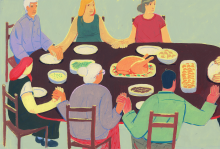
FOR SOME OF US, the Thanksgiving and Christmas holidays may be the only time all year that we see some of our relatives. Some probably harbor anxiety or even dread at the difficult conversations on politics and faith that surface during meals with family members who see the world very differently than you do.
In Advent, our thoughts turn to the meaning of Christ’s coming and the deep significance of the season for followers of Jesus—“waiting” for him to come, which has special and poignant meaning for us in the deep political and moral crisis in which we find ourselves. In many ways Advent is my favorite liturgical season, because it demands of Christians that we do the work of preparing our hearts for what it means that God came and lived as one of us in a world that needed (and needs) to be changed.

It is the tragedy of Christianity that the first hate crime in our constellation of texts is Matthew’s, in his telling the story of the passion. Jesus was a great teacher, an inspiring healer, and a man whose radical compassion touched everyone — women without honor, under-employed fisher folk, Roman soldiers, gentiles, Samaritans, scholarly Pharisees. The hearts of Palestinian Jews flocked to him, and this terrified the Romans. They tried to abort his movement by making his death a spectacle of cruelty and unutterable degradation.

But, interpretation of who Matthew 25:40 refers to as “the least of these” has gained attention most recently with many claiming that Jesus was speaking solely about his disciples or other Christians instead of the marginalized and oppressed communities that the verse so clearly seems to point to.

1. In the midst of a historically horrible refugee crisis, why didn’t you actively pursue helping the poor, the destitute, and those in desperate need?
Are followers of Jesus supposed to forsake compassion, sacrifice hospitality, and abandon love in favor of a political policy, national security, financial stability, and personal comfort? God is perfectly clear what the mandate is for helping those in need, and yet Christians continue to remain apathetic, passive, and even aggressively hostile toward the notion of aiding such victims.

What kind of example does the most popular leader in the world, Pope Francis, set for American political leaders who are neck deep in election campaigns?
If you are the one presidential candidate who regularly quotes Francis, Vermont Senator Bernie Sanders, who is Jewish, you have been quoting Francis for some time and have regularly said that you share his views on climate change and economic injustice.
“I’m not quite as radical as the Pope is,” he smilingly told Time Magazine. “But.”
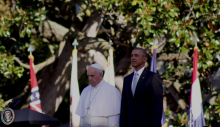
Stunning is the word that most comes to me after Pope Francis’ two-day visit to Washington, D.C. The country and the media was reveling in his presence, using language like “amazing,” “incredible,” and “wonderful” in response to this extraordinary moral leader who literally transformed our public discourse in the 48 hours he was in the nation’s capital. What these two extraordinary days mean going forward is the big question on all our hearts and minds.
At the formal welcoming ceremony on the South Lawn at the White House, a very traditional template was transformed by the “Vicar of Christ,” whose presence turned everyone’s language to one reference after another to those Christ called “the least of these” in the 25th chapter of Matthew. Never have I heard the most vulnerable being the most talked about in this city.
President Obama began the pope’s visit with these words, “What a beautiful day the Lord has made.”
Indeed. Then Pope Francis introduced himself to America as “a son of an immigrant family” who was “happy to be a guest in this country, which was largely built by such families.”
Point made.

The prophets’ preoccupation with justice and righteousness has its roots in a powerful awareness of injustice. That justice is a good thing, a fine goal, even a supreme ideal, is commonly accepted. What is lacking is a sense of the monstrosity of injustice. Moralists of all ages have been eloquent in singing the praises of virtue. The distinction of the prophets was in their remorseless unveiling of injustice and oppression, in their comprehension of social, political, and religious evils. —Abraham Joshua Heschel, The Prophets
Injustice anywhere is a threat to justice everywhere. We are caught in an inescapable network of mutuality, tied in a single garment of destiny. Whatever affects one directly, affects all indirectly. —Martin Luther King, Jr.
According to the U.S. Environmental Protection Agency, environmental justice is defined as:
The fair treatment and meaningful involvement of all people regardless of race, color, national origin, or income with respect to the development, implementation, and enforcement of environmental laws, regulations, and policies.
As we consider this definition, and look around our communities, do we find this fair treatment taking place? Are we aware of how economic and environmental decisions are made? Many times it can become so overwhelming that we think it best to leave it to the experts. Unfortunately, this can lead to exploitation, as discrimination typically takes place in poor and underserved communities where people may not understand their rights, or they choose not to fight back out of fear. As we dig deeper and the shackles are removed, we begin to see how economic and environmental justice are connected and how this exploitation is directly related to incentives like government funding, tax breaks, and land grabs that favor corporations over human beings and the environment. Does the end result benefit all God’s creation or just a wealthy few?

News articles about turmoil at General Theological Seminary had immediate impact on those of us who attended Episcopal seminaries.
But the news “went viral” far beyond that small coterie and for reasons beyond nostalgia.
For one thing, it’s a juicy soap opera. Faculty playing hardball, then finding themselves unemployed. A dean pushing back, then losing credibility as word about him spread. A board looking confused and high-handed. Students wondering if they, too, should go on strike.
But impact goes beyond the particular event itself. For something fundamental seems to be changing.

When you truly experience the love of God, there is nothing you won’t do for God. When you are truly thankful for salvation, no place is off limits to share the gospel. When you read Matthew 25, you are willing to dwell in any environment to be the hands and feet of Jesus. Our compassion compels us to love without conditions and work beyond the hours of Sunday morning.
We see the necessities of the people, so we respond with passion and purpose. However, we often push ourselves beyond measure and forget to allow God to nurture and nourish our own souls, so that we are able to pour out into others.

Once we have decided to follow Jesus, we cannot help but live out our personal beliefs in public ways. The demands of the Gospel refuse us the option of a purely inward spirituality.
While there are times when those in power listen to the guidance of moral and religious leaders, far too often we’re asked to be prophets. In the face of opposition, we pick up our crosses and lift up our voices on behalf of the disadvantaged.
In North Carolina, pastors and civil rights leaders, along with thousands of others, have been living out their personal faith in a very public way. Since late April, dozens of faith leaders and hundreds of others have been arrested at the state capitol as part of an ongoing protest call “Moral Mondays.” What would motivate these leaders to take such a strong stand at such a personal cost?

Tomorrow, millions of people across this land, will be celebrating our nation’s freedom. Many will be marking Independence Day by going to see the fireworks, watching Fourth of July parades, or just having a barbecue and enjoying time together with their family or friends.
One of the things I began doing a few years ago on the Fourth of July was to call a very special person in my life and in the life of my family. His name is Paul Anderson. Had it not been for Paul and his family, my family and I would not have been able to emigrate in 1987 from Poland to the United States. So on every July 4, I call Paul and thank him for helping me and my family arrive safely and settle in this country.
I tell him that he’s had an important part to play in so many good things I’ve experienced over the past 26 years that I’ve been living here — including discerning a Franciscan vocation and becoming a friar.
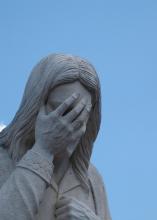
In response to my last article, “ 10 Things You Can't Do While Following Jesus,” I was accused multiple times of being political. All I was trying to do was follow Jesus. So, I thought it'd be interesting (and generate tons more hate mail) to show what a list would actually look like if I were being political intentionally. Like the first list, this is not a complete list, but it's a pretty good place to start.
There will be those who comment and send me messages berating me for “making Jesus political.” It's OK. Fire away. Jesus didn't worry much about stepping on political toes, and the Bible insists that governments be just toward the least of these (the books of the prophets alone make this point very clear). Frequently, people who are the most vocal about not making Jesus political are the same people who want prayer in school and laws based on their own religious perspectives. By a happy little circumstance that brings us to my list:

As a seminary graduate and a Masters of Social Work student, I have a passion for social justice and working to improve the wellbeing and health of vulnerable populations. After seminary, during my time as a youth leader, we often turned to Matthew 25:31-46, the familiar passage about “the least of these,” and discussed God’s emphasis on justice and serving the marginalized in our societies.
My time as a social work student, particularly through my current class on international social work, has expanded my concept of the “least of these.” We have learned about some of the most vulnerable populations around the world – child soldiers in Uganda and Colombia, young girls trafficked into the sex trade in Cambodia, HIV/AIDS patients from Haiti, migrants left to die in the desert while trying to cross the Mexican-U.S. border, and the list continues. These concepts were not completely unknown to me and would likely not be new to you either. This past week, however, we studied a different topic, one that has not drawn as much media attention – global mental health.
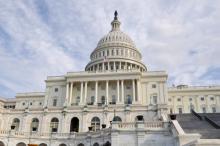
BALTIMORE — As Congress embarks on high-stakes budget negotiations to avoid the “fiscal cliff,” leaders of the U.S. Conference of Catholic Bishops are warning elected officials not to target programs for the poor and instead raise taxes and reduce defense spending.
“In developing frameworks for future budgets, Congress should not rely on disproportionate cuts in essential services to poor persons,” Bishop Stephen E. Blaire of Stockton, Calif., and Bishop Richard E. Pates of Des Moines, Iowa, wrote in a Nov. 13 letter to the House and Senate.
Blaire and Pates chair the bishops' committees on domestic and international issues, and the letter asks that “poverty-focused international assistance programs” also be spared because they are a small slice of the budget pie, are effective and enjoy bipartisan support.

We were walking up the beach, on the sand as the tide moved out toward the ocean. I was holding Zeke's hand, talking with him about sea things. "I didn't know jellyfish swam this close to the shore during the spring," he said in 5-year-old wonderment. "I bet that drift wood is as old as The Old Man and the Sea. I think a horseshoe crab's blood can be used to treat cancer."
"Look," I said.
"What is it, Dad?" he asked.
I picked up a shell out of the deep, hot sand and held it in my open hand.

Most people in America, whether they are religious or not, prefer consistency in the faith community to hypocrisy. One of the reasons the fastest growing demographic in religious affiliation surveys is now “none of the above” is that too many people see more religious hypocrisy than consistency.
Religion is not, at its core, politically partisan. But too often religion becomes a political tool; and we see that on both sides of the aisle. That does not mean people of faith shouldn’t have strong convictions or feelings about political issues or shouldn’t vote one way or another; or that there is a moral equivalency between the political parties and it doesn’t matter which way we vote. Elections are important, and people of faith should be voting as citizens and by their most basic values.
But let’s be clear: On Nov. 6, neither a Republican nor Democratic victory will bring in the Kingdom of God.

What struck me as he spoke was the sheer human potential of this my client, wasted. That matters for all of us because of an unflinching Scriptural text about how we can enter the kingdom of God: “for I was hungry and you gave me food; I was thirsty and you gave me something to drink; I was a stranger and you welcomed me, I was sick and you took care of me. I was in prison and you visited me….just as you did it to the least of those who are members of my family, you did it to me.” (Matt. 25:35-40)
That’s the test. Not beliefs or intentions. Actions.
Specific actions: Jesus tells us to visit people considered the worst among us, those accused of breaking the law.
It’s not just innocent prisoners we are to see; it’s prisoners. They are all Jesus.
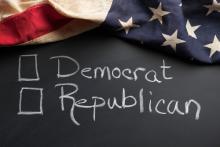
With the Republican and Democratic National Conventions having taken place over the last two weeks, we can officially say that we’re entering the election season (i.e., that time when the general public begins to pay attention).
A couple of friends who pastor churches in non-D.C. parts of the country asked me if we feel the need to address politics at The District Church, being in the very belly of the beast (my words, not theirs). Specifically, they were asking: Given the intense polarization and often-unproductive arguing that we see around us, even in the church, about the need to address how we interact with those who disagree with us.
So far, we haven’t needed to. In our church community, we have Republicans, Democrats, Independents, and yes, even people who don’t care about politics; we have Hill staffers, White House staffers, activists, advocates, lobbyists, policy wonks, and more — and we’ve all come together as the body of Christ, recognizing that our allegiance is first to Jesus before any party or even country.
Even so, every four years (or every two, if you pay attention to mid-terms; or all the time, if you’re even more politically engaged), posts about politics pop up with increasing frequency on social media, eliciting often-furious back-and-forths that usually end up doing nothing more than reminding each side how right they are and how stupid the other side is.
So I figured I’d try to offer a few suggestions on how we can engage with one another on matters of politics in healthy ways.

Both Republicans and Democrats have a religion problem and it has nothing to do with same-sex marriage, abortion or religious liberty. Rather it is budgets, deficits, and debt ceiling deadlines that are their serious stumbling blocks.
That’s right, in a city deeply divided between the political right and left there is a growing consensus from religious leaders about getting our fiscal house in order and protecting low-income people at the same time. Together, many of us are saying that there is a fundamental religious principle missing in most of our political infighting: the protection of the ones about whom our scriptures say God is so concerned.
Indeed, the phrase “a budget is a moral document” originated in the faith community, and has entered the debate. But those always in most in jeopardy during Washington’s debates and decisions are precisely the persons the Bible instructs us clearly to protect and care for — the poorest and most vulnerable. They have virtually none of the lobbyists that all the other players do in these hugely important discussions about how public resources will be allocated.
For us, this is definitely not a partisan issue, but a spiritual and biblical one that resides at the very heart of our faith. It is the singular issue which has brought together the U.S. Conference of Catholic Bishops, the National Association of Evangelicals, the Salvation Army, and the leaders of church denominations, congregations, and faith-based organizations across the nation.
 The puzzle here is not that readers of the Bible would tilt toward the political left. That, for me, as well as for thousands of other American evangelicals, is self-evident. Jesus, after all, summoned his followers to be peacemakers, to turn the other cheek, to welcome the stranger and to care for “the least of these.” He also expressed concern for the tiniest sparrow, a sentiment that should find some resonance in our environmental policies.
The puzzle here is not that readers of the Bible would tilt toward the political left. That, for me, as well as for thousands of other American evangelicals, is self-evident. Jesus, after all, summoned his followers to be peacemakers, to turn the other cheek, to welcome the stranger and to care for “the least of these.” He also expressed concern for the tiniest sparrow, a sentiment that should find some resonance in our environmental policies.
No, the real conundrum lies in the subtitle the editors of Christianity Today assigned to Franzen’s article, which was titled, “A Left-Leaning Text.” Adjacent to a picture of a Bible tilted about 45 degrees to the left, the editors added the subtitle: “Survey Surprise: Frequent Bible reading can turn you liberal (in some ways).”
The fact that anyone should register surprise that the Bible points toward the left should be the biggest surprise of all.